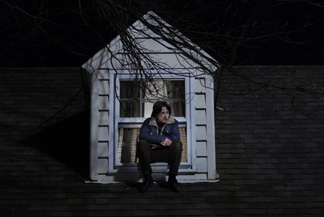Movie Review: Lymelife
By Tom Macy
March 30, 2009
BoxOfficeProphets.com

Derick Martini's debut feature "Lymelife," which he co-wrote with his brother Steve (guess you really had to know someone to be in on this thing), is a tale of familial dysfunction set in the standard desensitized cine-suburban community, in this case Long Island. The movie centers around the Bartlett family, which has the standard cine-suburban issues. Let's check them off, shall we? You have protagonist Scott (Rory Culkin), an introverted-yet-intuitive 15-year-old who has a crush on Adrianna (Emma Roberts, niece of Julia), the girl next door, who is way too good-looking to be interested in him. His mother (Jill Hennessy), whose best days are behind her, is trapped in a loveless marriage to his ambitious but dillusioned father (Alec Baldwin, unfortunately not playing his character from 30 Rock). Dad is having an affair with the girl next door's mom, (Cynthia Nixon, getting a chance to play a sex object for once) whose husband (Timothy Hutton) is out of work and has Lyme Disease, which has somehow illuminated his mind, making him a basement hermit who occasionally emerges to dole out well-timed wisdom (more on that later).
In his first time directing a feature, Mr. Martini chooses to go the route that many filmmakers have gone by directing something personal. The problem is, apparently everyone (or at least every filmmaker) has the same personal issues, resulting in bunch of personal movies that feel very, very similar.
With a plucky mandolin theme and cheerfully crisp photography, the likes of quirky indie comedies Juno and Little Miss Sunshine spring to mind (how much do you want to bet the poster will be hand drawn?). The story itself, including major plot points, very closely resembles the more dramatic The Ice Storm. Now, if you told me I was going to see The Ice Storm meets Little Miss Sunshine I'd be stoked, but The Martini brothers seem to be awkwardly caught between the two. Instead of a seamless blending of comedy and drama, we're given jarring tonal shifts between scenes and sometimes even between lines. For example, in the obligatory air-clearing screaming match between the Scott parents, Baldwin appears to be hinting at comedy while Henessey is giving her stone cold Lady M. It's almost as if Martini had two versions of the scene and just mashed them together hoping it would work.
The actors, clearly being encouraged to improvise, seem to be confused about what kind of film they're in, giving scenes a staged quality. Clearly there was supposed to be more a comedic element than there was. Upon watching the trailer, after I saw the film, I found that comedy was firmly established, suggesting that the script read much funnier than it plays. Curiously, though, lines that rang false in the film were much funnier in the trailer, leaving me to think some adjustments on pacing may do this film some a world of good. Too late now, I guess.
Still, while it may lack the zip that made some of its brethren so irresistible (I'm thinking specifically of Ellen Page), Lymelife is an admirably performed and adequately crafted installment in this familiar genre. However, the one major deviation from that mold is the film's biggest detriment (I've always said I'll take a truthful cliché over contrived originality any day). The storyline involving Timothy Hutton's character is meant to tie the film together, serving as the central theme. Representing, of all things, the threat of Lyme Disease (in the days before it was treatable), he is to be a constant reminder of mortality hovering over the characters, "enlightened" by his illness and the sole voice of reason. But instead, the whole thing is just a ridiculous plot device. Hutton and the disease don't seem to have any effect on the characters or their actions and he remains on the periphery. Whenever they do resurface, it's basically to remind us of their presence. The film would have worked better if Hutton's character was removed completely and it was just called "Life". Sure, then it would be complete carbon copy of every other dysfunctional family indie ever made but at least you'd be saved from the preposterous ending - which is completely absurd.
The most rewarding takeaway is the fine performance given by Rory Culkin. With an easygoing simplicity that has transferred nicely from his childhood roles (I still think he's great in Signs) he proves, along with his brother Kieran, that the Culkin family circus of the early '90s has produced some solid talent. Speaking of Kieran, here he gets a chance to play the military alpha male, a role he pulls off but is not particularly right for. Whenever he's asked to be the tough guy, there's just a slight sense of reaching. He's much better in roles like the one he played in 2002's Igby Goes Down, which was a similar announcement to the world that he actually could act.
Undoubtedly, the slews of Andersonian (is that obnoxious sounding?) films I've seen over the past decade have informed my judgment of this film. If I weren't constantly being reminded of The Ice Storm, I possibly would've enjoyed it more. For sure, given today's cinematic landscape you could do much worse. For my money, though, leaving the theater with the urge to rewatch The Squid and the Whale and check IMDb for the brothers Culkin means this one missed the mark. Perhaps if I had Timothy Hutton's illness-aided clarity, I could derive more substance from Lymelife, but being one of the unenlightened, it will have to remain mystery.